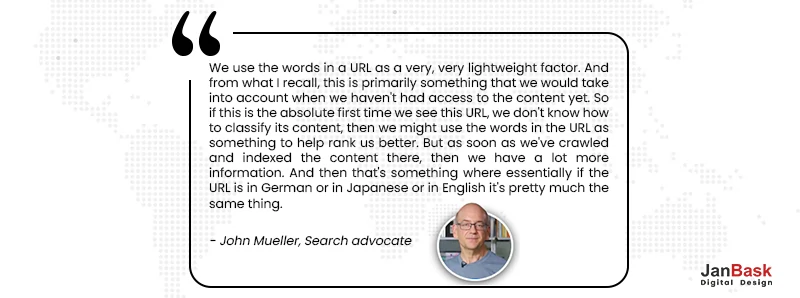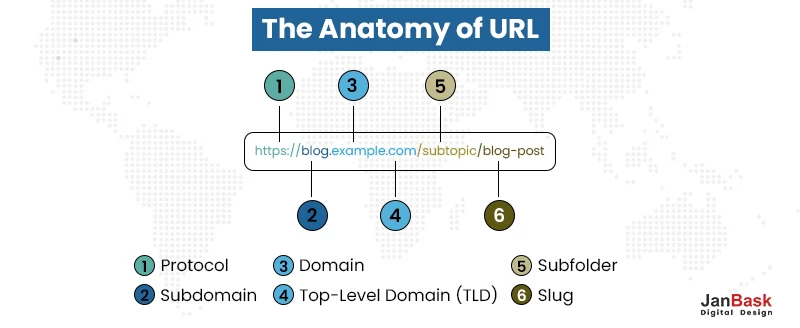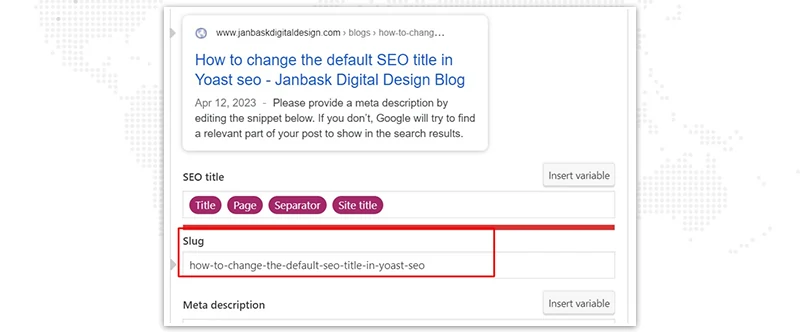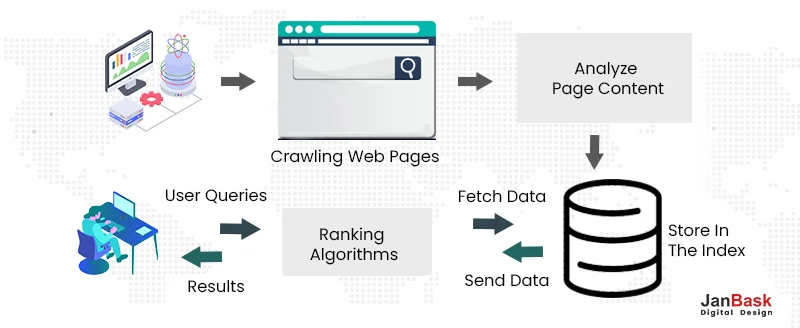
To be the most prominent brand on the internet, one needs to plan SEO strategies for the website. When researching, many exciting terms come across us for digital marketing metrics, Search Engine Optimization tactics, web designing, content creation, etc. They all must be kept straight and optimized because they affect your website's SEO scores!
You must have come across the term “Slug." Google’s Search Advocate, John Mueller, says that- “URL is a very lightweight factor for rankings.”
Here is an extract from John Mueller’s conversation regarding the importance of URL Slug:
So, what is a Slug in SEO, then? And why do you need to optimize it?
In this blog post, we’ll explain everything that you need to know about it!
A slug refers to the part of a URL that comes after the backslash [“/”] and identifies a particular webpage or post on a website in an easily readable format.
For instance - Let’s consider the following URL
https://www.janbaskdigitaldesign.com/blogs/what-is-a-slug
Here, the slug is - “what-is-a-slug”
It's essential to have a unique slug for each page that provides the same information to the readers and search engines.
In simple words, a URL is the complete address of a webpage. It comprises a domain name and other detailed information to create a complete web address enabling a visitor to find a particular resource on the internet.
URLs consist of -

URL is a complete webpage address, whereas URL slug is a part of the URL, and it’s necessary for enhancing page ranking on SERP. It’s also essential from a keyword’s perspective. For instance, assume that you are looking for ‘how to apply to foreign universities’; here, the URL slug is ‘how to apply for foreign universities’ and will appear at the top of SERP as it shows a long tail keyword.
The SEO slug best practices also help search engines simplify the aim of complete content. A proven methodology avoids special characters when creating a URL or a URL slug.
You might be surprised to know that URLs impact your SEO strategy. Still, you might think, does it really make sense? Let’s assume that you’ve copied a link, and after pasting it into your browser, you find a stream of random letters, numbers, and symbols. It irritates you and seems untrustworthy, and might dissuade you from sharing or linking to that specific URL. Now imagine what happens if a search engine comes across that same content stream. You know that search engine algorithm requires explicit and well-optimized content for understanding the data they come into contact with.
This is because owning a clean, short, and well-optimized URL slug supports website visitors' and search engines' understanding of webpages.
Another importance of having a URL slug for SEO ranking is that it can be a pristine source of the ranking keyword. Adding a keyword to your slug makes it possible to target particular terms, and a reader might not understand the intimation, but a search engine will add that keyword to your ranking results.
Looking for Cost-Effective Custom SEO Services?

Assume that your prospective visitor is searching for an article on ‘How to Improve SEO for website.’ An ideal slug that you can build for this search will be - www.xyzwebsite/how-to-improve-seo-for-website.
On the contrary, if your slug is not optimized, then the URL of your page might end up looking like this - www.xyzwebsite/article14562.php
An SEO slug that looks like a random group of letters, numbers, and special characters is unsuitable for the website and its continued growth. It can harm your business and look confusing to the visitors; hence it's essential to keep in mind to optimize each SEO slug of each webpage.
Two essential reasons for having well-optimized slugs are
Visitors use slugs to understand a web page's contents before clicking on its link. It’s true, regardless of where the link appears, i.e., whether it was being entered directly into the search bar, showed up on a SERP, or shared by a colleague via social media. In every instance, you wish visitors to look at the URL and be assured to click on it since it is of professional quality and provides them with the relevant information they were searching for.
Search engines have the same perspective toward SEO slugs. Similar to a web page's titles and headers, they also read slugs to get information on the page. Thus, having a well-optimized and self-explanatory slug can significantly impact your potential to rank for target keywords.
Indeed! They do. SEO Slug best practices typically enclose the primary keyword, which is subsequently identified by search engine bots in order to rank the webpage. Search engines approve of keyword-rich slugs, and this technique will give you higher chances of ranking your pages on the SERP.
The best feature of building a slug is that it ultimately depends on you as the page owner. You can personalize your slug how you would like and select the keywords you wish to rank for. This ensures that both search engine crawlers and visitors are motivated to click on your page or post a link.
As a business owner, one must know 5 interesting facts about SEO to remain updated.
Now, it’s easy to edit a slug for your publishing posts if you're working with WordPress. You'll soon get a better idea of this by walking through the following section -
For the inexperienced, the term “Slug” arises from WordPress and its community. Meanwhile, when WordPress is installed without configuring permalink settings, the final URL would look something like this: wwww.domainname.com/?rt=504 or something random like this. It's evident that this isn’t SEO-friendly at all. If you’re writing on an important topic and raising your site's visibility, prospective visitors can simply go past your website as a scam or question its authority. Such visitors are unlikely to click on your link, irrespective of whether your content is of high quality.
To keep away from such instances, you have to edit your slug.
Here are some options to make your URL look professional. Generally, the URLs are classified into
Ideally, select ‘Post name’ option because you might have already used targeted keywords in your post’s title.
Besides changing the struct

ure of the permalink for all the posts, you can also create or edit slug whenever you create new content for publishing. At the time of creating a new post, you’ll find an option to edit your slug below the SEO title of your post, and once the URL structure gets finalized, you just need to click on OK and finalize the page’s slug.
Slug editing is just a half-done task, and the remaining 50% comprises optimizing it for better performance and SEO. As discussed earlier, optimizing a slug is crucial since it helps boost your webpage's visibility and ensures it reaches your targeted audience. Additionally, an optimized slug helps you give a far more professional look to all your URLs.
For instance, if the title of your post is Top 10 Benefits Of Learning A Musical instrument, WordPress or any other platform will showcase your URL as - www.xyzdomainname.com/top-10-benefits-of-learning-a-musical-instrument.
This URL has a slug structure but doesn’t serve the purpose because it contains too many words and might confuse crawlers and readers. That’s why you will have to optimize it to something more definitive. For more valuable WordPress SEO, you can change its structure to just “musical benefits” and immediately draw your visitors' attention.
Optimizing slug is essential; therefore, here are a few takeaways to help you better understand how to attain it.
A first stage that search engines offer for each search query is - Search engine indexing. In this process, the search engine crawlers go through each page of your website and save all the required information in their database. The URL of your website will be stored at Google’s indexing stage to analyze all the essential attributes of the page.
Google search engine provides careful attention concerning URLs of web pages; because of this, it’s essential to build an SEO slug that’s accurately optimized and offers accurate information about every page. If you don’t optimize your slug correctly, your web page will lose rankings. Therefore, follow all the tips mentioned in this article to create the best SEO slug for your website.
It's one of the URL slug best practices where you should include the focused keyword in your slug; make this a habit before publishing your posts. Focus mainly on the primary keyword which you’re trying to rank. You can take the help of SEO tools to determine whether the focus keyword is present in your slug or not.
Stop words are phrasing or terms that aren’t essential in a URL slug. These words would not change the meaning of your slug, even if removed. For instance, numbers, articles, prepositions, and so on.
Brief URL slugs are appealing, self-explanatory for the readers, and SEO-friendly. If you could reconsider the previously discussed example, how-to-improve-SEO-for-websites is truly short and specific.
The main reason for doing this is that, at times, users directly search with the help of search terms, like how to improve seo for websites. When people search using such terms, your URL slug will perfectly match the search term and will be visible to the visitors.
Do you want to create a solid online presence for your brand by getting to the top page of Google search results? Then click here.
It's a minute detail that deserves to be discussed here. When editing the slug, ensure that the words are lowercase every time. A technical reason behind it is how it basically reads and occurs. Apache web servers interpret URLs in lowercase letters distinctly from URL slugs with uppercase letters.
To separate words in your URL slug, always use dashes[“-”] since it's a universal practice and if you’ve been using any other character, shift to “-” from now on.
Just in case you’ve already set an SEO slug for a webpage that you are dissatisfied with; it can be easily changed. Furthermore, to simply change the content of a specific SEO slug, it's also required to make changes to the address itself - i.e., to redirect the visitors and search engines to the new URL.
The ultimate solution to this problem is to assign a 301 redirect to the new page URL. A 301 redirect is a permanent redirect from the old page URL to the new one. Whenever a search engine or your site visitor clicks on a 301 redirect, they’ll be redirected to a different URL, i.e., to a new URL you chose.
These types of redirects indicate to search engines and users that the page they are looking for has been moved permanently. It’s one of the URL slug best practices - to change your old URLs permanently to new URLs, use 301 redirects.
Always remember that when you change your desired page URL to a new URL, the search engines can take some time to discover the 301 redirects accurately, admit it as a proper redirect, and then assign the same rankings and trust to the "new" page as that of the "previous" page. It can take longer if the search engine crawlers rarely visit your original web page URL or if your new URL isn't set correctly and it doesn't adequately resolve.
Be careful when doing the 301 redirect - ensure you have done everything correctly. The last thing you must consider is if search engines or visitors can't find your new URL. This can have a really harmful effect on your business, so be sure to double-check that everything is working smoothly.
With countless other budget control concerns for an online business, search engine optimization may be shelved. In particular, for online businesses, balancing efforts across many avenues includes - identifying which efforts offer the best advantages and determining how to get better with them- i.e., from social media to paid search campaigns, to email marketing, and so on.
So, hiring professional SEO services seems worth it! The major benefit of hiring professional SEO services is that their professional team oversees this entire channel on your behalf. And can give 100% of their time and effort to handle it. An SEO agency, with the help of your performance data, fine-tune and adjust your SEO campaigns accordingly.
By analyzing website analytics and performance data, their SEO experts will find areas of your site that offer the best opportunities and can continue to grow for a long-time. They will also help by discovering the intent-driven keywords that provide you with the best value. Thus, SEO experts can work URL-by-URL by combining this data with ranking data and focusing more on web traffic from people who are more likely to convert.
Professional SEO consultant use different SEO technologies for website analysis, ensuring that every page of your website has good HTML meta-data, functioning “href” linking, and a crawlable website structure. SEO Consultants are the ones who are responsible for planning, implementing, and managing customers’ overall SEO strategy. Click here to learn about the essential aspects of choosing the best SEO company.
A URL slug isn’t just a way to communicate webpage names to site visitors but also provides important data for search engines to manage and show your pages. When you know what is SEO slug and how to improve your SEO slug, your overall URL strategy will help improve your SEO results. Optimizing the URL slug is an effective but simple way to improve your page’s online visibility; it is not very complex or intricate to edit and optimize it. You need some hands-on experience with what happens if you use different URL slug structures and find the best way to structure them.
Are you still struggling when working with SEO slugs or SEO often? Our professional SEO company would be pleased to help your business reach its full potential. You can shape your business the way you want it; just make the right decisions. Here’s the list of the 10 best SEO agencies in Maryland.
Interested in Affordable Custom SEO Solutions?

Q1. What is SEO?
SEO or Search Engine Optimization is the process of ranking a website on SERP to improve its visibility when visitors search for relevant keywords and search queries.
Q2. Does my business need SEO?
Yes, your business should invest in SEO since it provides a way to improve website traffic without paying for every click.
Q3. What is the maximum length of a URL slug?
Most modern browsers and Google Chrome allow a URL of up to 2048 characters. But it doesn’t mean that you must use them all. Adhere to using 3 to 5 catchy words in the slug.
Q4. What will happen if I change the URL slug of the page?
When a URL slug is edited, it changes the page's address, i.e., all the links pointing towards that specific page will no longer work, and the visitors will see a 404 error message. You can avoid this situation by creating a redirect from your old URL to the new URL.
Q5. How long does it take to rank on google?
Well, the answer is: it depends. Because gone are the days of launching a site, optimizing it for title tags, and ranking on search engines within a few weeks, you can’t expect a website to rank for competitive search queries overnight after the launch. A website takes time to rank organically since Google only ranks relevant sites with built-up authority.
Q6. How to choose the best SEO agency?
Determining which SEO agency best fits your needs isn’t easy. Check the examples of websites that they’ve optimized and keyword rankings that have helped those websites achieve. Preferably, you need to look for examples that are recent and, at the same time showing good progress currently, not a year ago! But having said that, many SEO agencies might not be able to show you the related data to date because of client confidentiality.
Q7. Why are URL slugs important for SEO?
Using URL slugs that are well-optimized, clear, and relevant to the keywords you want to target for that specific website is an excellent way to tell search engines what the page is all about and to drive more organic traffic from the search.
Q8. How can slugs help your seo efforts?
URL Slugs can affect the SEO of your website in two ways - Besides communicating with search engines, URL slugs can also help communicate with end users who come across your website in search results, alluring them to click on the content. URL slugs are also the best way to communicate with Google and other search engines.
Q9. What characters should I avoid using in my URL slugs?
You must avoid using special characters in your URL slugs. However, if you are required to use a special character, like an apostrophe, then encode it first.
Q10. Are URL slugs important for indexing?
Search engine indexing is one of the most important and vital steps in a search engine’s main functions. So, when the search engines index the URL of every page, then you can be assured that the search engines give attention to the URL slugs, and indeed they do.
P
Hi, I’ve a question, is ranking related to URL slugs? how can I retrieve my old rankings?
J
Hey, Paxton! Kindly reach out to info@janbaskdigitaldesign.com
N
Thanks for sharing valuable information about what is a slug in SEO.
J
Thank you, Nash! Kindly reach out to info@janbaskdigitaldesign.com
O
What is the word limit of slug?
J
Thank you! Kindly reach out to info@janbaskdigitaldesign.com
L
Hello, is there any ideal length for the URL slug?
J
Thank you! For more info contact info@janbaskdigitaldesign.com
K
Still confused about the difference between slug and URL. Is there any difference, or are both the same only?
A
Thanks for sharing such a helpful article about what is slug in SEO and how to optimize it. but I’m just confused about when I change those slugs from my site then. Will those links relate to the previous slug remain or get broken?